In this article:
Healthy, well-functioning salivary glands produce enough saliva to keep the mouth moist and comfortable. Besides its lubricating properties, saliva plays a key role in maintaining optimum oral health and in facilitating the digestion process.
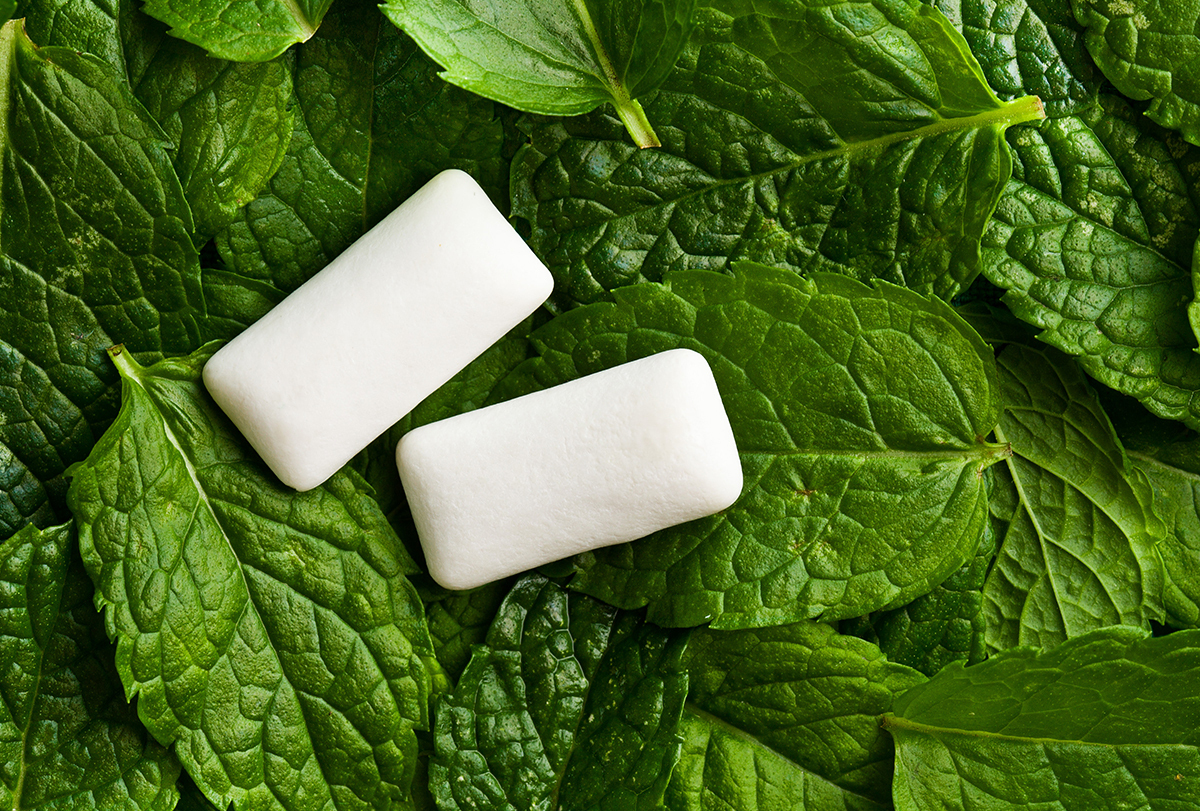
But if your mouth does not produce enough saliva, it can become utterly dry, uncomfortable, and smelly. This may happen occasionally due to low fluid intake, stress, or after a strenuous activity, which is completely normal and nothing that cannot be resolved with proper rehydration.
But if it becomes a chronic issue despite optimum water intake, there must be something wrong with your salivary glands which requires medical attention. The doctor will diagnose the underlying cause and then recommend the appropriate treatment accordingly.
But you can also try some natural remedies that can help reduce the symptomatic discomfort associated with dry mouth and kick your salivary glands into action.
Home Remedies for Dry Mouth
Here are some tips and remedies that can help alleviate dryness in the mouth:
1. Increase fluid intake
Dehydration is one of the most common reasons behind dry mouth. So, the best thing you can do is increase your fluid intake to keep your body hydrated. Proper hydration makes it easier for your body to produce more saliva and get rid of the symptoms of dry mouth. (1)(2)
- Consume an ample amount of water throughout the day. If you cannot drink water, suck on small pieces of ice.
- Eat partly frozen chunks of water-based fruits and vegetables such as pineapple, watermelon, and cucumber.
- Drink smoothies, fruit juice, or vegetable juice.
- Drink 1 to 2 glasses of coconut water daily.
- Drink herbal teas such as chamomile tea or other noncaffeinated options.
- Eat soft and liquid foods such as stews and soups.
Avoid caffeinated beverages, sodas, and alcoholic drinks as they can contribute to dehydration.
2. Try sugar-free gums and candies
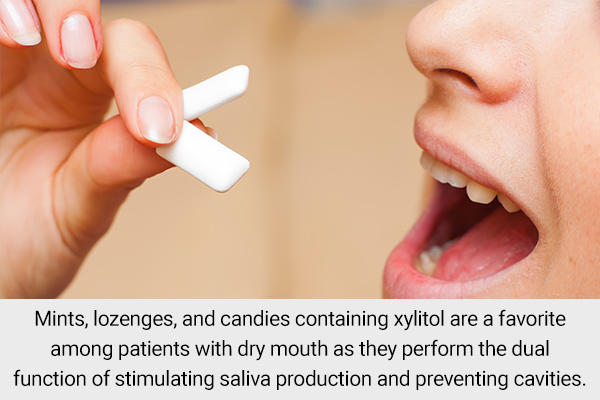
Mints, lozenges, and candies containing xylitol are a favorite among patients with dry mouth as they perform the dual function of stimulating saliva production and preventing cavities.
Don’t be in a rush to gulp down these sugarless treats. Savoring them in your mouth for a long time, such that they are allowed to dissolve slowly, will help you maximize their true potential. (3)
Chew sugar-free gum or suck on sugar-free hard candies to keep your mouth moist and free from cavities. Prefer to choose citrus, cinnamon, or mint-flavored gums.
Note: Chewing gum is not recommended for people who also suffer from jaw joint pain.
3. Exploit the healing potential of aloe vera
An age-old remedy to treat dry mouth is aloe vera. It also helps protect the sensitive tissue in the mouth and enhances the functioning of the taste buds. (4)
How to use:
- Drink ¼ cup of aloe vera juice daily to cure dry mouth.
- You can also rinse your mouth with aloe vera juice a few times a day.
- Alternatively, apply pure aloe vera gel around your mouth using a cotton swab. Leave it on for several minutes and then rinse your mouth with cold water. Do this two to three times a day.
4. Ginger is good for dry mouth
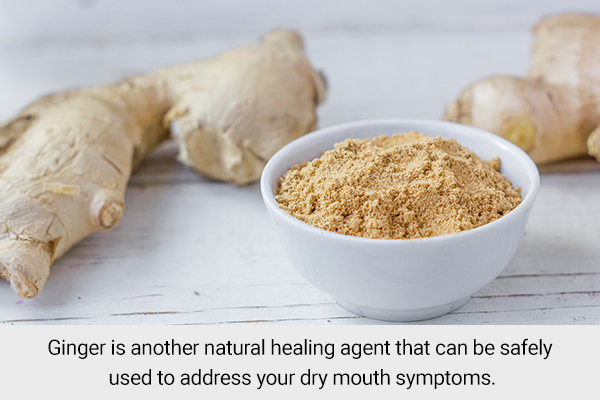
Ginger is another natural healing agent that can be safely used to address your dry mouth symptoms. It is proven to be quite effective in spurring the flow of saliva, thereby keeping your mouth hydrated and fresh for longer. (5)
How to use:
- Chew a small piece of fresh ginger slowly. Do this several times a day to fight dry mouth symptoms.
- You can also drink 2 to 3 cups of ginger tea mixed with honey daily to stimulate your salivary glands.
5. Use a room humidifier
If your living environment is overly dry, the lack of moisture in the air can contribute to dry mouth over time.
It is therefore recommended to use a humidifier in your living or working space to raise the moisture quotient in the air. Breathing in this treated air can relieve the discomfort associated with dry mouth to a great extent.
A cold-air humidifier is especially helpful for mouth breathers as they sleep, as they tend to experience their worst symptoms at night. (6)
6. Cayenne pepper will facilitate saliva flow
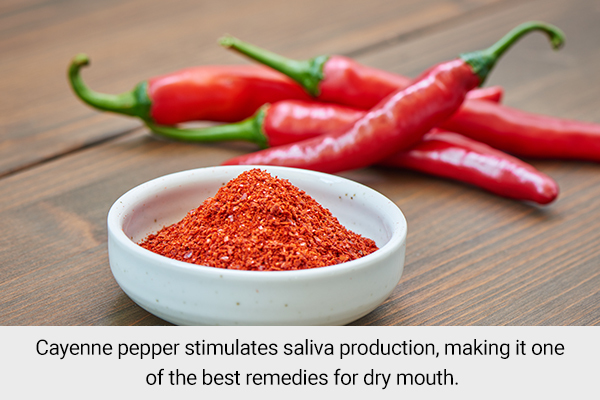
Cayenne pepper stimulates saliva production, making it one of the best remedies for dry mouth. Also, it helps bolster the taste buds so you can better distinguish sour, sweet, salty, and bitter flavors. (7)
How to use:
- Press a little bit of ground cayenne pepper on a wet finger, and then rub it around your tongue. This may cause a burning sensation for some time, but it will stimulate your salivary glands to produce more saliva.
- Also, sprinkle cayenne pepper powder in your soups, salads, and other dishes.
- Alternatively, you can take cayenne pepper capsules after consulting your doctor.
7. Chew on fennel seeds as a post-meal ritual
The fragrant properties of fennel seeds make it an effective agent against bad breath associated with dry mouth. It is richly supplied with flavonoids that help trigger the salivary glands into action and increase saliva flow. (8)
How to use:
- Munch on fennel seeds several times a day to treat dry mouth.
- You can also mix together equal amounts of fennel seeds and fenugreek seeds. Dry roast them in a pan, grind them thoroughly, and add a little salt. Eat ½ teaspoon of this mixture after each meal.
8. Marshmallow root is a therapeutic aid
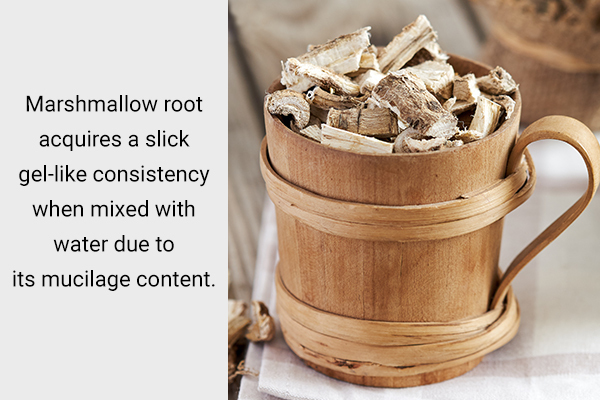
Marshmallow root acquires a slick gel-like consistency when mixed with water due to its mucilage content. When used as a dry mouth remedy, this gel helps coat and soothe the mouth as well as the throat.
Plus, it can effectively relieve many other discomforts associated with the said condition and can help keep your oral cavity in the prime of health. (9)
Marshmallow root-infused mouthwashes are a recommended choice to address a number of painful oral-health issues such as inflammation in the gums, mouth ulcers, and sore throats.
Whip up your own mouthwash by using a cold marshmallow-infused tea to rinse your mouth. Swish it around your oral cavities until the affected tissues are coated with the infusion.
9. Cardamom is a natural mouth freshener
An Ayurvedic remedy to fight dry mouth is cardamom. Chewing on a pod of cardamom stimulates the flow of saliva and helps moisten the mouth. Also, this aromatic aid can save you from the scourge of dryness-induced bad breath. (10)
How to use:
- Chew a pod of cardamom thoroughly after every meal or whenever your mouth is dry.
- Alternatively, add 1 teaspoon of cardamom powder to 1 glass of hot water. Let it steep for 10 minutes and then drink it. Do this once or twice daily.
- You can also rinse your mouth with lukewarm cardamom tea twice daily.
10. Oil pulling for optimum oral health
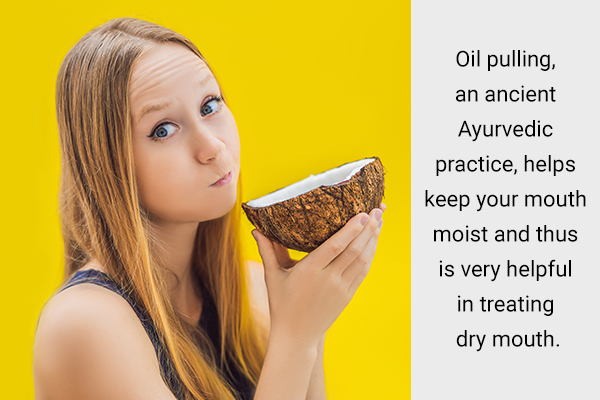
Oil pulling, an ancient Ayurvedic practice, helps keep your mouth moist and thus is very helpful in treating dry mouth. It is also beneficial in maintaining overall oral health and eliminating bad breath. Oil pulling can be done with coconut oil, sesame oil, or any other edible vegetable oil. (11)
How to use:
- Put 1 tablespoon of extra-virgin coconut oil in your mouth.
- Swish the oil around your mouth thoroughly for 15 minutes.
- Spit it out and rinse your mouth with warm water.
- Brush your teeth as usual.
- Repeat the process daily in the morning before eating anything.
Note: Do not gargle or swallow the oil.
Bonus Remedy
Lemon to combat dry mouth
Lemon juice can assist in stimulating saliva production and relieving the symptoms of dry mouth. Its acidic nature can help cleanse your mouth and eliminate foul breath. (12)
- Add the juice of half a lemon and a little honey to 1 glass of water. Sip this water throughout the day to stay hydrated. Considering the acidic nature of lemon, which can cause enamel erosion, it is recommended to sip this lemon-honey water with a straw.
- You can also drink homemade lemonade to treat dry mouth. Be sure to use lemonade that does not contain sugar.
- Also, sprinkle a little salt on a small piece of lemon. Rub it on your tongue to enhance your taste buds.
How can I Prevent Dry Mouth?
Here are some ways you can prevent the occurrence of dry mouth:
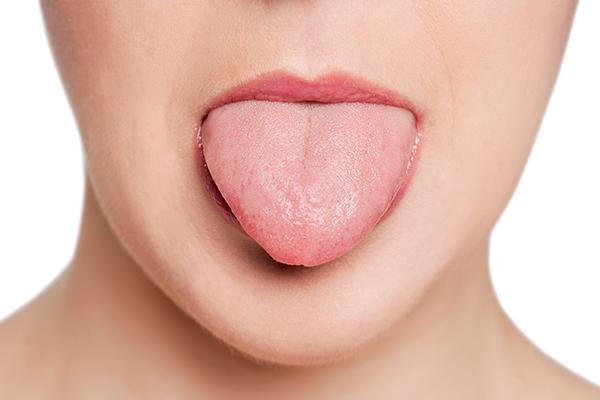
- If you have an option, then avoid taking medicines such as diuretics, antihistamines, and decongestants that can cause a dry mouth.
- The importance of adequate hydration cannot be stressed enough to prevent a whole gamut of health risks, including dry mouth. It may serve you well to sip rather than gulp water and other sugar-free fluids frequently during the day.
- There are certain drinks that tend to leave your mouth utterly dry after consumption, which include caffeine-containing beverages, carbonated sodas, and alcohol. It is important to limit the consumption of such drinks in the interest of your oral health.
- Tobacco has a drying effect on the mouth, which is why smoking and chewing tobacco must be avoided.
- Choose your toothpaste wisely, one that contains fluoride to help keep your teeth strong but is without the foaming ingredient sodium lauryl sulfate as it can further irritate an already dry mouth.
- In addition to brushing and flossing your teeth, clean your tongue daily.
- Reduce your intake of sugary and acidic foods to minimize the risk of tooth decay and erosion.
- If you have a tendency to breathe through your mouth, make a concerted and conscious effort to breathe through the nose as much as possible.
- It’s best to swear off any irritating foods that are dry, spicy, or excessively hot or cold.
- Munch on snacks that have high water content such as celery sticks to stimulate the saliva glands and add moisture to your mouth.
- Visit your dental hygienist regularly for preventive dental care, and get plaque removal done by a professional at least twice a year.
Final Word
Xerostomia can turn from being a minor nuisance to a major detriment to your overall health and quality of life if it continues for too long.
So consult your doctor and start treatment without delay. The above listed serve as a great adjunct to your medical treatment.

- Was this article helpful?
- YES, THANKS!NOT REALLY


